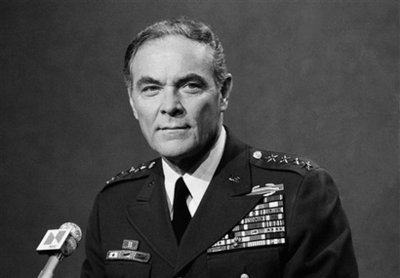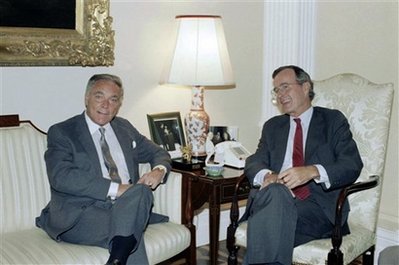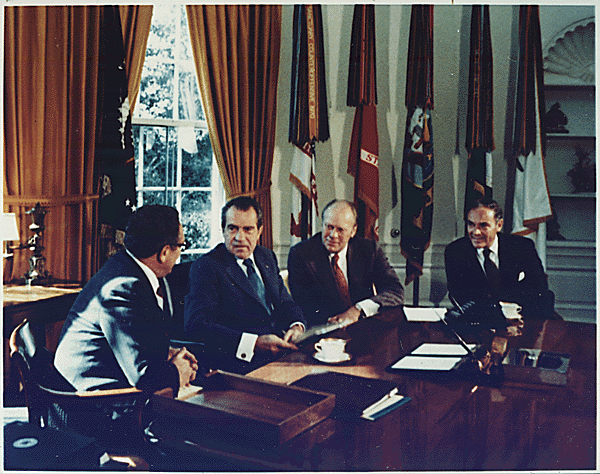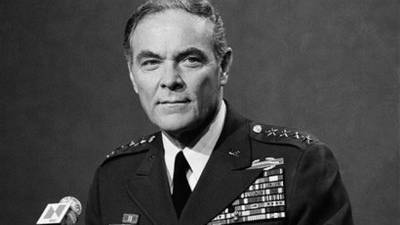Alexander Haig, Aide to U.S. Presidents, Dies at 85
Source: news.yahoo.com
Soldier and statesman, Alexander Haig never lived down his televised response to the 1981 assassination attempt on President Ronald Reagan. Haig died Saturday at age 85 having held high posts in three Republican administrations and some of the U.S. military's top jobs.Video from: YouTube.com

In this March 21, 1978 file photo, Gen. Alexander Haig, speaks at a Pentagon news conference on in Washington. (AP Photo/Thumma, File)
Haig was a four-star Army general who served as a senior adviser to three presidents and had presidential ambitions of his own. He died early in the day at Johns Hopkins Hospital in Baltimore of complications from an infection, his family said. He was surrounded by his family, according to two of his children, Alexander and Barbara.
Haig's long and decorated military service launched the Washington career for which he is better known, including jobs in the Nixon, Ford and Reagan administrations.
President Barack Obama praised Haig on Saturday as a public servant who "exemplified our finest warrior-diplomat tradition of those who dedicate their lives to public service."
Secretary of State Hillary Rodham Clinton said Haig "served his country in many capacities for many years, earning honor on the battlefield, the confidence of presidents and prime ministers, and the thanks of a grateful nation."

In this Sept. 25, 1985 file photo, U.S. Vice President George H.W. Bush meets with former Secretary of State Alexander Haig. Haig served Republican presidents and ran for the office himself.(AP Photo, File)
Many Americans will remember the strong-willed Haig most vividly for what he later called his "poor choice of words." Hours after Reagan was shot, then-Secretary of State Haig went before the cameras intending, he said later, to reassure Americans that the White House was functioning.
"As of now, I am in control here in the White House, pending the return of the vice president," Haig said.
Some saw the comment as a power grab in the absence of Vice President George H.W. Bush, who was out of town.
The ridicule that followed hastened Haig's departure from the last of an extraordinarily varied string of top government jobs.
In his book, "Caveat," Haig later wrote that he had been "optimistic if I had imagined I would be forgiven the imprecision out of respect for the tragedy of the occasion."
Public figures looked beyond that episode in response to his death.
"I think of him as a patriot's patriot," said George P. Shultz, who succeeded Haig as the country's top diplomat in 1982.
"No matter how you sliced him it came out red, white and blue. He was always willing to serve."
Haig was awarded the Distinguished Service Cross and numerous other honors during his three decades in the Army, and — as vice chief of staff — helped lead the transition to an all-volunteer military, recalled Army Chief of Staff Gen. George Casey.
Former Secretary of State Madeleine Albright, a Democrat, called the staunchly Republican Haig a great public servant.
"Alexander Haig devoted his career to serving our country, both as a soldier and as a diplomat," Albright said. "He was a great American patriot and an inspiration to all who defend and cherish freedom."
Born Dec. 2, 1924, in the Philadelphia suburb of Bala Cynwyd, Alexander Meigs Haig spent his boyhood days dreaming about a career in the military. With the help of an uncle who had congressional contacts, he secured an appointment to the U.S. Military Academy at West Point in 1943.
After seeing combat in Korea and Vietnam, Haig — an Army colonel at the time — was tapped by Henry Kissinger to be his military adviser on the National Security Council under Nixon. Haig "soon became indispensable," Kissinger said of his protege.
Nixon promoted Haig in 1972 from a two-star general to a four-star rank, passing over 240 high-ranking officers with greater seniority.
The next year, as the Watergate scandal deepened, Nixon turned to Haig and appointed him to succeed H.R. Haldeman as White House chief of staff. He helped the president prepare his impeachment defense — and as Nixon was preoccupied with Watergate, Haig handled many of the day-to-day decisions normally made by the chief executive.
On Nixon's behalf, Haig also helped arrange the wiretaps of government officials and reporters, as the president tried to plug the sources of news leaks.

President Richard M. Nixon meets in the Oval Office with Vice President Gerald R. Ford, Secretary of State Henry A. Kissinger, and Chief of Staff Alexander Haig. 1973.
About a year after assuming his new post as Nixon's right-hand man, Haig was said to have played a key role in persuading the president to resign. He also suggested to Gerald Ford that he pardon his predecessor for any crimes committed while in office — a pardon that is widely believed to have cost Ford the presidency in 1976.
Years after serving as one of Nixon's closest aides, Haig would be dogged by speculation that he was "Deep Throat" — the shadowy source who helped Washington Post reporters Bob Woodward and Carl Bernstein break the Watergate story. Haig denied it, repeatedly, and the FBI's Mark Felt was eventually revealed as the secret source.
Although the reporters made it a point not to comment on rumors about the identity of Deep Throat, an exception was made for Haig, Woodward told AP on Saturday. "Because he was so disturbed about it, about being accused of being this insider who would provide information to reporters, eventually I told people categorically that he was not Deep Throat because it was not true, it was implausible, and he felt it was unfair for us not to answer that question," Woodward said.
Following Nixon's resignation, Haig stayed with the new Ford administration for about six weeks, but then returned to a military career as commander in chief of U.S. forces in Europe and supreme allied commander of NATO forces — a post he held for more than four years. He quit during the Carter administration over the handling of the Iran hostage crisis.
Haig briefly explored a run for the presidency in 1979 but decided he didn't have enough support and instead took a job as president of United Technologies — his first job in the private sector since high school.
When Ronald Reagan became president, Haig came back to public service as Reagan's secretary of state and declared himself the "vicar of American foreign policy."
His 17-month tenure was marked by turf wars with other administration officials — including Defense Secretary Caspar Weinberger and national security adviser William Clark.
Two months into the new administration, Haig was portrayed as pounding a table in frustration when the chairmanship of a crisis management team went to Bush. Despite the clashes, Haig received high praise from professional diplomats for trying to achieve a stable relationship with the Soviet Union.
In his book, Haig said he had concluded during a 1982 trip to Europe with the president that the "effort to write my character out of the script was under way with a vengeance." He resigned days later.
Weinberger, interviewed in 2002 for the University of Virginia Miller Center's oral history project on Reagan, said Haig had a strong personality and found it difficult to adjust to civilian lines of authority after years in the military, including as the Supreme Allied Commander in Europe.
A good general, Haig as a civilian Cabinet official became convinced that others in the Reagan White House were out to get him, Weinberger said.
"Someone said it was a great mistake to give anybody a position with the title of 'supreme' in it," Weinberger said.
"He kept getting angrier and angrier. He threatened to resign several times. Finally the president said, 'All right.'"
Describing himself as a "dark horse," Haig sought the Republican presidential nomination for the 1988 elections. He told supporters about his desire to "keep the Reagan revolution alive," but he also railed against the administration's bulging federal deficit — calling it an embarrassment to the GOP.
Haig dropped out of the race just days before the New Hampshire primary.
During his career in public service, Haig became known for some of his more colorful or long-winded language. When asked by a judge to explain an 18 1/2-minute gap in one of the Nixon tapes, Haig responded: "Perhaps some sinister force had come in."
And later, when he criticized Reagan's "fiscal flabbiness," Haig asserted that the "ideological religiosity" of the administration's economic policies were to blame for doubling the national debt to $2 trillion in 1987.
Haig is survived by his wife of 60 years, Patricia; his children Alexander, Brian and Barbara; eight grandchildren; and his brother, the Rev. Francis R. Haig.
Article from: news.yahoo.com






















